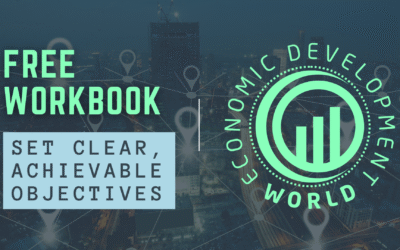Do you ever feel like you’re constantly playing catch-up in the fast-paced world of local and regional economic development? You’re not alone. The sheer volume of information and the pressure to deliver results in a political environment can leave even the most experienced professionals feeling overwhelmed.
𝘛𝘩𝘪𝘴 𝘸𝘦𝘦𝘬𝘦𝘯𝘥’𝘴 𝘜𝘚 𝘵𝘢𝘳𝘪𝘧𝘧 𝘢𝘯𝘯𝘰𝘶𝘯𝘤𝘦𝘮𝘦𝘯𝘵𝘴 𝘢𝘳𝘦 𝘢 𝘤𝘢𝘴𝘦 𝘪𝘯 𝘱𝘰𝘪𝘯𝘵 – 𝘩𝘰𝘸 𝘸𝘪𝘭𝘭 𝘵𝘩𝘦𝘺 𝘢𝘧𝘧𝘦𝘤𝘵 𝘰𝘶𝘳 𝘭𝘰𝘤𝘢𝘭 𝘦𝘤𝘰𝘯𝘰𝘮𝘪𝘦𝘴?
The good news is that you don’t have to be an expert in everything. Economic development is a team effort, and continuous learning is essential.
Next – we will outline the NACE competency framework, using the functional area of 𝙚𝙫𝙞𝙙𝙚𝙣𝙘𝙚-𝙗𝙖𝙨𝙚𝙙 𝙙𝙚𝙘𝙞𝙨𝙞𝙤𝙣 𝙢𝙖𝙠𝙞𝙣𝙜 (the use of research and intelligence) in local and regional economic development.
𝗧𝗵𝗲 𝗡𝗔𝗖𝗘 𝗙𝗿𝗮𝗺𝗲𝘄𝗼𝗿𝗸: 𝗔 𝗧𝗼𝗼𝗹 𝗳𝗼𝗿 𝗦𝗲𝗹𝗳-𝗔𝘀𝘀𝗲𝘀𝘀𝗺𝗲𝗻𝘁: 𝘦𝘷𝘪𝘥𝘦𝘯𝘤𝘦-𝘣𝘢𝘴𝘦𝘥 𝘥𝘦𝘤𝘪𝘴𝘪𝘰𝘯-𝘮𝘢𝘬𝘪𝘯𝘨
The NACE framework outlines different competency levels: Novice, Apprentice, Competent, and Expert. Let’s explore what each level looks like in terms of evidence-based decision making:
𝗡𝗼𝘃𝗶𝗰𝗲: Relies on basic information and lacks a network of expertise. Decisions are often reactive rather than strategic.
𝗔𝗽𝗽𝗿𝗲𝗻𝘁𝗶𝗰𝗲: Uses basic data and reports from external sources but struggles to translate them into actionable insights.
𝗖𝗼𝗺𝗽𝗲𝘁𝗲𝗻𝘁: Conducts regular research and analysis, often with the help of statisticians or economists. They understand the strengths and limitations of data sets and use them to inform strategies and resource allocation.
𝗘𝘅𝗽𝗲𝗿𝘁: Possesses deep knowledge of research, statistics, and policy. They conduct their own research through surveys and focus groups, and curate a network of analysts and practitioners. They are seen as thought leaders in the field, able to anticipate economic shocks and develop long-term solutions.
𝗪𝗵𝗲𝗿𝗲 𝗗𝗼𝗲𝘀 𝗬𝗼𝘂𝗿 𝗧𝗲𝗮𝗺 𝗦𝘁𝗮𝗻𝗱?
By reflecting on the NACE framework, you can identify areas for improvement within your team. Here are some questions to consider:
💥How effectively do you use evidence to inform your decisions?
👓Do you have a clear understanding of the key economic drivers in your region?
Are you able to translate data into actionable insights?
🛠️How well-equipped are you to deal with change and economic shocks?
Getting the right team together, and building expertise takes time and dedication. Be honest about your current strengths and weaknesses, and prioritise areas for development.
Build your own SMART objectives with our toolkit
"𝗪𝗲 𝗻𝗲𝗲𝗱 𝘁𝗼 𝗯𝗼𝗼𝘀𝘁 𝘁𝗵𝗲 𝗹𝗼𝗰𝗮𝗹 𝗲𝗰𝗼𝗻𝗼𝗺𝘆." "𝗦𝘂𝗽𝗽𝗼𝗿𝘁 𝗴𝗿𝗲𝗲𝗻 𝗴𝗿𝗼𝘄𝘁𝗵." "𝗜𝗺𝗽𝗿𝗼𝘃𝗲 𝗲𝗻𝘁𝗿𝗲𝗽𝗿𝗲𝗻𝗲𝘂𝗿𝘀𝗵𝗶𝗽." 𝗦𝗼𝘂𝗻𝗱 𝗳𝗮𝗺𝗶𝗹𝗶𝗮𝗿? In 31 years...





